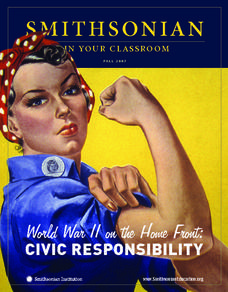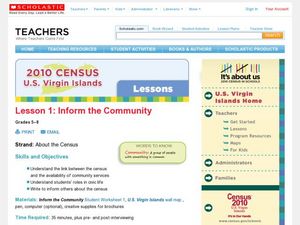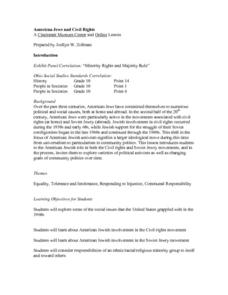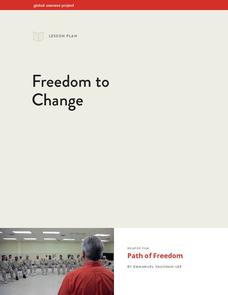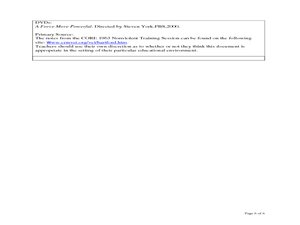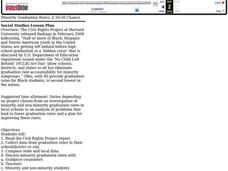Facing History and Ourselves
Life for German Youth in the 1930s: Education, Propaganda, Conformity, and Obedience
The German youth faced an onslaught of propaganda when they went to school, thanks to the Nazi regime led by Hitler during World War II. Pupils relate their education experiences to German youth by analyzing primary source readings,...
Curated OER
Civic Engagement for Us?
Learners identify the different forms of civic engagement. They identify their responsibilities at the different levels of government. They also analyze young leaders running for office.
National Endowment for the Humanities
Revolution '67, Lesson 1: Protest: Why and How
To some people, protesting is as American as apple pie, but the factors that lead to protests can be as confusing to veteran activists as to today's youth. Revolution '67 explores the riots in Newark, New Jersey as a case study. Using...
Curated OER
Martin Luther King and Writing as a Tool for Social Change
Students explore writing as an agent for social change. In this Social Studies lesson, students examine the power of writing using Dr. King's Letter from a Birmingham Jail. Students will practice the technique of persuasive writing by...
Curated OER
World War II on the Home Front: Civic Responsibility
Students explore World War II. In this World War II lesson, students discover how volunteerism demonstrates civic responsibility. The lesson uses World War II-era posters to appeal to the learners and help them to understand the...
Curated OER
Inform the Community
Students gain an understanding of the U.S. Census. For this social studies civics lesson plan, students explore understand the link between the census and the availability of community services.
Curated OER
American Jews and Civil Rights
Tenth graders examine the Civil Rights movement of the 1960's and how American Jews were involved. They discuss the responsibilities of any minority or ethnic group. They consider the process of change in politics as well.
Curated OER
Civil Rights in America
Seventh graders visit the Smithsonian and are shown different exhibits. They are to make their own drawing about one of the exhibits and write about the experience.
Curated OER
Protecting the Environment Through Civic Activism
Students discuss how to protect the environment through civic activism. They watch a video about someone who stood up to the government to protect the environment. They also identify something in their community that could be improved.
Center for Civic Education
The Power of Nonviolence: Change Through Strategic Nonviolent Action
How did major historical figures, such as Henry David Thoreau, Susan B. Anthony, and Mohandas K. Gandhi, explain and defend their beliefs in nonviolence? Your learners will begin by studying the backgrounds of these individuals, and then...
Global Oneness Project
Freedom to Change
Here's something unusual and thoughtful: have your scholars do some pensive reflection themselves before tackling how such meditative techniques are used in prison rehabilitation programs. They watch the "Path of Freedom" video found...
Curated OER
Measuring Civic Engagement
High schoolers begin the lesson by defining what a citizen is in today's society. In groups, they brainstorm a list of qualities and responsibilites a good citizen should have. They also develop and give a survey that measures the amount...
Curated OER
Voting: Your Civic Responsibility
Fifth graders research the viewpoints of the major Presidential candidates. Using this information, they create brochure comparing and contrasting them on important issues. They write a persuasive essay to state the importance of voting...
Judicial Branch of California
Protecting our Freedoms: The Bill of Rights
Take to the stage! Integrate both drama and civic skills by asking pupils to create and perform skills that demonstrate the importance of the amendments in the Bill of Rights. After reviewing the Preamble to the Constitution, learners...
Curated OER
ON BECOMING A NONVIOLENT WARRIOR
Students examine the concept of non-violent social change. In this lesson on social change, students research and role play to demonstrate ways in which this might be accomplished while making connections to various events in history.
Oakwood Publishing
Workshop 4: Constitutional Convention
How do new amendments become part of the US Constitution? AP government students explore, analyze, and use the US Constitution to develop a deep understanding of the interworkings of law and government while practicing synthesis and...
Curated OER
The Children's March
Students watch the film, The Children's March. In this civil rights lesson, students view a video on the Civil Rights Movement in Montgomery Alabama. Students then complete a worksheet that will prompt a classroom discussion about the...
Curated OER
Getting Involved at School
Young scholars discuss ways to get involved in activities at school. In groups, they brainstorm a list of qualities of a person who is engaged in civics and how they can become involved in activities at school related to government. They...
iCivics
Step Six: Real World Policies
Sometimes it takes real-world examples to get concepts to click. Use the resource to instruct middle schoolers on the relevancy of public policy in today's world. Exercises include a 5W + H graphic organizer, class discussion, and...
Curated OER
A Comparison of Dunbar and Central High In Little Rock, Arkansas
Young sociologists analyze the needs of white and black learners. They discuss how Central and Dunbar High Schools are alike and different before 1957. They write an essay comparing the two schools.
Curated OER
Japanese-American Relocation
Consider the causes and effects that led to the internment and relocation of Japanese Americans during WWII. Learners read the story "Baseball Saved Us" and selected chapters from Farewell to Manzanar. Then, they view a slide-show, and...
Curated OER
Minority Graduation Rates: A 50-50 Chance
Pupils read the Civil Rights Project report. Students collect data from graduation rates in their school/district or city. Pupils compare state and local data. Students discuss and analyze minority graduation rates. Pupils compare local...
BBC
Crime
Crime and punishment! Learners discuss the law, civics, and crime in the UK. They brainstorm lists of crimes and possible punishments, complete activities on a website, role-play a Juvenile Court scenario, and try to think of ways they...
PBS
Constitution Day
Travel back to 1787 as young scholars investigate the creation of the US Constitution. After first working in small groups to create sets of classroom rules, young scholars go on to read a summary of the Constitution and watch a short...






